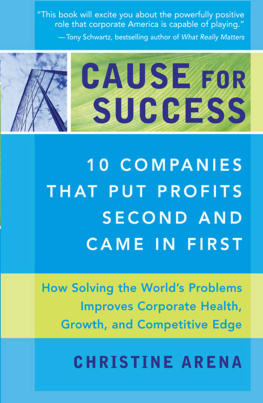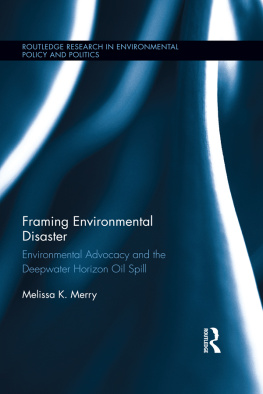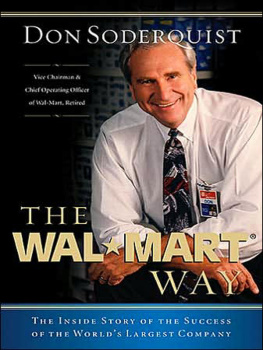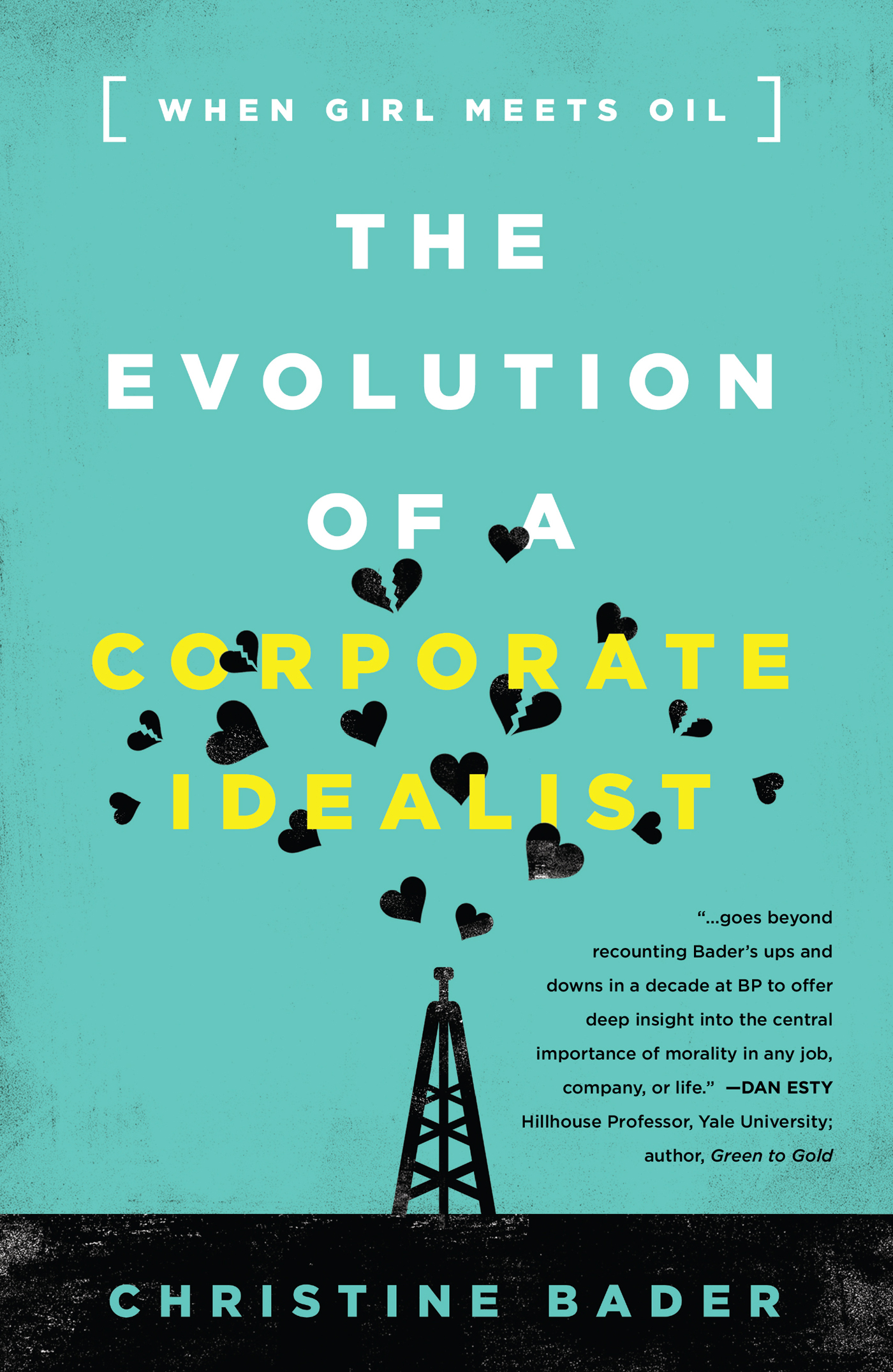First published by Bibliomotion, Inc.
39 Harvard Street
Brookline, MA 02445
617-934-2427
www.bibliomotion.com
Copyright 2014 by Christine Bader
All rights reserved. No part of this publication may be reproduced in any manner whatsoever without written permission from the publisher, except in the case of brief quotations embodied in critical articles or reviews.
Library of Congress Cataloging-in-Publication Data
Bader, Christine.
The evolution of a corporate idealist: when girl meets oil / Christine Bader. pages cm
Summary: The Evolution of a Corporate Idealist is based on Baders experience with BP and then with a United Nations effort to prevent and address human rights abuses linked to business Provided by publisher. ISBN 978-1-937134-88-4 (hardback) ISBN 978-1-937134-89-1 (ebook) ISBN 978-1-937134-90-7 (enhanced ebook)
1. Bader, Christine. 2. BP (Firm)Social aspects. 3. Petroleum industry and tradeSocial aspects. 4. Social responsibility of business. 5. Human rights. I. Title.
HD9571.9.B73B33 2014
338.76655092dc23
2013046545
Praise for
The Evolution of a Corporate Idealist
and Christine Bader
Business must be part of the solution to the complex challenges facing our planet. This requires authentic and committed leaders at all levels within a company working together to help make this a reality. In The Evolution of a Corporate Idealist: When Girl Meets Oil, Christine Bader gives us a firsthand account of what it takes to get this right and provides some salutary lessons about what it means when companies get it wrong.
Paul Polman, CEO, Unilever
Companies increasingly recognize that they have a legitimate interest in respecting human rights. Christine Bader has been on the front lines of both setting and implementing human rights standards for business, and provides an engaging narrative of what it takes to ensure that human rights are a reality for all.
Mary Robinson, former president of Ireland; former United Nations High Commissioner for Human Rights
With insight and humor, Christine Bader sheds light on the inner workings of multinational business. The Evolution of a Corporate Idealist is a must-read for all of us who care about ensuring that ethics and morality have their rightful place on the business agenda.
William H. Donaldson, 27th chairman, SEC; former chairman and chief executive, New York Stock Exchange; co-founder, former chairman and CEO, Donaldson, Lufkin & Jenrette
For all those who have seen what multinational corporations are doing and wondered, What were they thinking?read this book! Bader takes us deep inside big business, past the slick P.R. and newspaper headlines. Whether you resonate with the title Corporate Idealist or think its an oxymoron, this book is a fascinating read. Love Big Oil or hate it, youll never look at it the same.
Annie Leonard, Founder, The Story of Stuff Project
Christine Bader writes as she is: genuine, funny, compassionate, on a constant search for truth and impact. The Evolution of a Corporate Idealist: When Girl Meets Oil is a unique and valuable contribution to one of the greatest challenges of the modern era: how to leverage the creativity and drive of business to achieve a just and sustainable world.
Aron Cramer, President and CEO, BSR (Business for Social Responsibility)
Too many companiesand the investors and consumers that support themstill take a short-term, narrow view that is threatening our planet; the sustainability movement has often felt like one step forward, two steps back. In The Evolution of a Corporate Idealist: When Girl Meets Oil, Christine Bader gives us an insiders perspective on why that is the case. I relate to her struggle between optimism and pessimism, and suspect many others will too.
Jeffrey Hollender, founder and former CEO, Seventh Generation
The Evolution of a Corporate Idealist is a deeply personal reflection on a vastly neglected subject: the hopes and successes, disappointments and disillusionments, of corporate social responsibility practitioners in global companies. Christine Bader recounts her own journey, starting with infatuation and fulfillment, to feeling jilted, experimenting with taming capitalism through the United Nations, and ending up back in the private sector, a bit bruised but considerably wiser. This makes for an eminently readable introduction to the burgeoning field of corporate social responsibility.
John G. Ruggie, Harvard University; former United Nations special representative for business & human rights
Girl meets Big Oil, Big Oil breaks girls heart. So far, so predictable. But Christine Baders extraordinary, warts-and-all memoir reveals what happens when idealism and business converge in both the heart and the mind.
John Elkington, co-founder of Environmental Data Services (ENDS), SustainAbility and Volans; co-author, The Power of Unreasonable People
Christine Baders The Evolution of a Corporate Idealist paints a vivid picture of the changing world of business, the rise of sustainability as a value in many companies, and the authors own awakening to the complexity of corporate responsibility. Written as a lively and compelling narrative, the book goes beyond recounting Baders ups and downs in a decade at BP to offer deep insight into the central importance of morality in any job, company, or life.
Dan Esty, Hillhouse Professor, Yale University; author, Green to Gold
To A & C & A
A good business should be both competitively successful and a force for good.
BP, What We Stand For, Statement of Business Policies, 2002
There is a great deal of difference in believing something still, and believing it again.
W.H. Auden

B ig Oil and I got together in the summer of 1999. It all started a few months earlier, in a packed lecture hall in New Haven, Connecticut.
with his oil titan peers to become the first head of a major energy company to acknowledge the reality of climate change and urge action.
I was a first-year MBA student at Yale, wondering whether I would find inspiration in the private sector after years of working in government and nonprofits and observing the power of business from the outside.
After college I did a year of community service with City Year, the AmeriCorps program, and got to know the corporate sponsors who donated money and goods and sent employees out to mentor and serve with us. I was a Teaching Fellow in Community Service at Phillips Academy Andover, organizing students from the well-endowed prep school to work with residents of Lawrence, a bustling textile producer in the late 1800s that had become one of the poorest cities in Massachusetts. I worked in the New York City Mayors Office, where companies were wooed for their jobs and tax revenues.
It dawned on me that while many companies were making positive contributions to society, some of them were simultaneously creating the conditions that necessitated their largesse. The poor neighborhoods I worked in had been devastated by the loss of industry, with their pain then compounded as the tax base dwindled and school quality declined. In some cases, businesss negative impacts were much more direct: companies polluted, or lobbied to replace a public garden with a parking lot, or failed to hire anyone from the community they had moved into.
The influence of business intrigued me. Who are these company executives? How and why do they get to decide whether a community thrives or falters?








